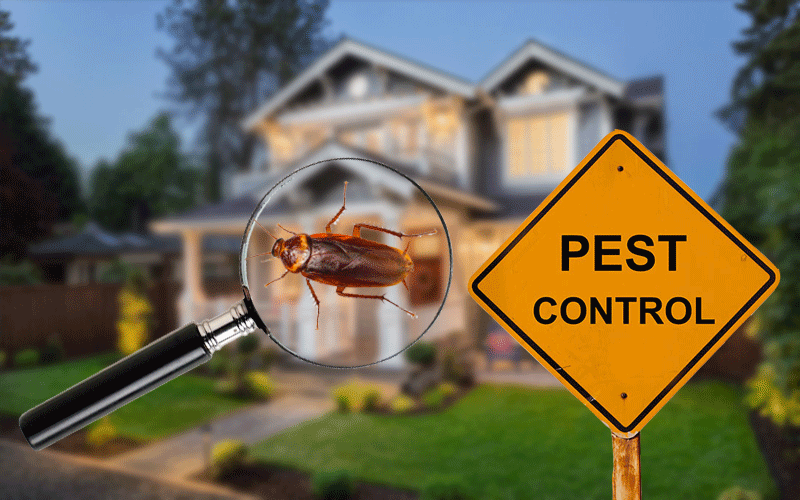Reliable Insect Control Services: An In-Depth Consider Elimination Techniques and Prevention Actions
In the realm of bug control solutions, the effective administration of infestations needs a thorough method that incorporates numerous techniques and steps for both removal and avoidance. From Integrated Bug Monitoring (IPM) approaches that prioritize sustainable services to chemical extermination methods designed for targeted removal, the collection against insects is multifaceted and vast.

Integrated Parasite Management (IPM) Methods
Integrated Bug Administration (IPM) Strategies incorporate a detailed approach to pest control that focuses on prevention, tracking, and control methods to effectively manage parasite populaces. By integrating different techniques, IPM aims to lessen the effect of insects while also decreasing the reliance on chemical pesticides. Prevention exists at the core of IPM, stressing methods like correct cleanliness, upkeep of hygiene, and securing entrance factors to prevent parasites from infesting buildings.
Chemical Extermination Techniques
Chemical extermination techniques are typically employed in parasite control services to properly eliminate bug populaces that posture a danger to human health and wellness and property. These strategies include making use of numerous chemical compounds particularly designed to target and eliminate insects such as insects, rats, and other unwanted animals. The application of chemicals, pesticides, rodenticides, and various other chemical representatives is thoroughly regulated to make certain optimum effectiveness while minimizing risks to human beings, family pets, and the environment.
One of the key advantages of chemical elimination strategies is their capacity to give quick and targeted results, making them specifically useful in cases of extreme infestations or urgent insect control demands - a1 portland bed bug exterminator. Nonetheless, it is vital to highlight the importance of proper handling, application, and disposal of these chemical items to stop unintentional harm
Furthermore, incorporated pest monitoring (IPM) approaches frequently combine chemical extermination techniques with various other approaches such as sanitation, habitat modification, and organic controls to create a lasting and extensive insect control method. By incorporating chemical extermination strategies carefully within an IPM structure, pest control services can effectively manage bug populaces while minimizing prospective dangers to human health and wellness and the atmosphere.
Biological Parasite Control Techniques
Utilizing all-natural predators and parasites to take care of insect populations Home Page is a sustainable approach known as organic pest control. a1 commercial pest control portland. One usual biological control technique includes presenting natural opponents of the target bug varieties, such as ladybugs for aphid control or nematodes for termite problems.
Another effective biological control technique is the usage of microbial insecticides. These are naturally happening microorganisms, such as fungis, germs, and viruses, that particularly target and infect specific pest varieties. By utilizing these microbial agents, pest populations can be effectively lowered without triggering or harming useful microorganisms damage to the atmosphere.
Physical Insect Prevention Steps
Applying physical bug avoidance steps entails using barriers and structural adjustments to prevent bugs from infesting a residential property or entering. Setting up door sweeps, screens on home windows, and sealing fractures in the structure can help prevent insects like bugs and rats from gaining accessibility inside.
One more physical prevention procedure is the usage of obstacles like fence to maintain larger bugs such as raccoons or deer away from the building. By implementing these physical insect prevention measures, home proprietors can substantially minimize the risk of pest invasions and the damage they can cause.
Expert Insect Evaluation Treatments
Performing organized and extensive pest examinations is a fundamental facet of expert parasite monitoring methods. Specialist pest examiners are trained to thoroughly examine homes for signs of infestations, recognizing pest species, entrance points, and helpful problems.

Final Thought
To conclude, reliable insect control services use a variety of methods, including Integrated Pest Administration approaches, chemical elimination methods, organic controls, and physical avoidance actions. Specialist insect inspection procedures play a critical function in identifying and dealing with pest issues in a prompt fashion. By applying a mix of these methods, homeowner can successfully take care of and protect against bug problems.
From Integrated Insect Management (IPM) techniques that focus on lasting services to chemical extermination strategies designed for targeted removal, the arsenal against pests is complex and huge.Integrated Bug Administration (IPM) Methods encompass an extensive method to pest control that concentrates on tracking, control, and avoidance methods to successfully manage pest populations.Chemical elimination methods are frequently used in bug control solutions to successfully remove insect populaces that pose a danger to human health and wellness and residential property.Employing all-natural killers and bloodsuckers to handle bug populations is a lasting method recognized as biological pest control.In verdict, reliable insect check over here control services utilize a range of strategies, consisting of Integrated Bug Administration techniques, chemical elimination methods, organic controls, and physical avoidance procedures.